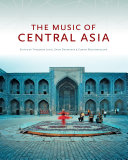Related Research Articles

Overtone singing – also known as overtone chanting, harmonic singing, polyphonic overtone singing, and diphonic singing – is a set of singing techniques in which the vocalist manipulates the resonances of the vocal tract, in order to arouse the perception of additional, separate notes beyond the fundamental frequency being produced.

The Tuvans or Tyvans are a Turkic ethnic group indigenous to Siberia who live in Russia (Tuva), Mongolia, and China. They speak Tuvan, a Siberian Turkic language. They are also regarded in Mongolia as one of the Uriankhai peoples.
Paul Jerrod Pena was an American singer, songwriter and guitarist of Cape Verdean descent.

Kongar-ool Borisovich Ondar was a master Soviet and Russian Tuvan throat singer and a member of the Great Khural of Tuva. Ondar was born near the Khemchik River in western Tuva, in the village of Iyme. In the Central Asian tradition of self-fulfilling child naming, Kongar-ool literally translates to "loud boy." In 1983 Ondar was drafted into the army, but was discharged due to a neck injury. After, he served several years in prison in Siberia. In 1992, after his release, Ondar won an international throat-singing contest, which brought invitations to perform in Europe and the United States and began his singing career.
Tuva is a part of Russia, inhabited by a Turkic people. Tuvans are known abroad for khoomei (xöömej), a kind of overtone singing.

Sainkho Namtchylak is a singer originally from Tuva, an autonomous republic in the Russian Federation just north of Mongolia. She is known for her Tuvan throat singing or Khöömei.
The music of Central Asia is as vast and unique as the many cultures and peoples who inhabit the region. Principal instrument types are two- or three-stringed lutes, the necks either fretted or fretless; fiddles made of horsehair; flutes, mostly open at both ends and either end-blown or side-blown; and jew harps, mostly metal. Percussion instruments include frame drums, tambourines, and kettledrums. Instrumental polyphony is achieved primarily by lutes and fiddles.

Wu Man is a Chinese pipa player and composer. Trained in Pudong-style pipa performance at the Central Conservatory of Music in Beijing, she is known for playing in a broad range of musical styles and introducing the pipa and its Chinese heritage into Western genres. She has performed and recorded extensively with Kronos Quartet and Silk Road Ensemble, and has premiered works by Philip Glass, Lou Harrison, Terry Riley, Bright Sheng, Tan Dun, Zhao Jiping, and Zhou Long, among many others. She has recorded and appeared on over 40 albums, five of which have been nominated for Grammy Awards. In 2013, she was named Instrumentalist of the Year by Musical America, becoming the first performer of a non-Western instrument to receive this award. She also received The United States Artist' Award in 2008.

The ensemble Alash is a throat singing band from Tuva, Russia, that performs traditional Tuvan music with some non-traditional influences.
Smithsonian Folkways is the nonprofit record label of the Smithsonian Institution. It is a part of the Smithsonian's Smithsonian Center for Folklife and Cultural Heritage, located at Capital Gallery in downtown Washington, D.C. The label was founded in 1987 after the family of Moses Asch, founder of Folkways Records, donated the entire Folkways Records label to the Smithsonian. The donation was made on the condition that the Institution continue Asch's policy that each of the more than 2,000 albums of Folkways Records remain in print forever, regardless of sales. Since then, the label has expanded on Asch's vision of documenting the sounds of the world, adding six other record labels to the collection, as well as releasing over 300 new recordings. Some well-known artists have contributed to the Smithsonian Folkways collection, including Pete Seeger, Ella Jenkins, Woody Guthrie, and Lead Belly. Famous songs include "This Land Is Your Land", "Goodnight, Irene", and "Midnight Special". Due to the unique nature of its recordings, which include an extensive collection of traditional American music, children's music, and international music, Smithsonian Folkways has become an important collection to the musical community, especially to ethnomusicologists, who utilize the recordings of "people's music" from all over the world.
The Aga Khan Music Initiative in Central Asia was established in 2000 by His Highness the Aga Khan with the aim of assisting in the preservation of Central Asia's musical heritage by ensuring its transmission to a new generation of artists and audiences, both inside the region and beyond its borders. It is an initiative of the Aga Khan Trust for Culture, an agency of the Aga Khan Development Network.
Steven Feld is an American ethnomusicologist, anthropologist, and linguist, who worked for many years with the Kaluli (Bosavi) people of Papua New Guinea. He earned a MacArthur Fellowship in 1991.

Tuvan throat singing, the main technique of which is known as khoomei, includes a type of overtone singing practiced by people in Tuva, Mongolia, and Siberia. In 2009, it was included in the Representative List of the Intangible Cultural Heritage of Humanity of UNESCO. The term hömey / kömey means throat and larynx in different Turkic languages. That could be borrowed from Mongolian khooloi, which means throat as well, driven from Proto-Mongolian word *koɣul-aj.
Valentina Suzukei is one of the leading ethnomusicologists in the Tyva Republic (Tuva), Russia.
Timbral listening is the process of actively listening to the timbral characteristics of sound.
Sevʹyan Izrailevich Vainshtein was a Russian ethnographer, archaeologist, and historian of Siberian and Central Asian peoples. He was a professor at the Institute of Ethnology and Anthropology of the Russian Academy of Sciences in Moscow.
Moses Asch was an American recording engineer and record executive. He founded Asch Records, which then changed its name to Folkways Records when the label transitioned from 78 RPM recordings to LP records. Asch ran the Folkways label from 1948 until his death in 1986. Folkways was very influential in bringing folk music into the American cultural mainstream. Some of America's greatest folk songs were originally recorded for Asch, including "This Land Is Your Land" by Woody Guthrie and "Goodnight Irene" by Lead Belly. Asch sold many commercial recordings to Verve Records; after his death, Asch's archive of ethnic recordings was acquired by the Smithsonian Institution, and released as Smithsonian Folkways Records.

Aldyn-ool Takashovich Sevek was a master Tuvan throat singer.

Soriah is an American overtone singer, performance artist, multi-instrumentalist, and shamanic ritualist headquartered in Portland, Oregon and The Tuvan Republic. His music is a synthesis of traditional forms such as Tuvan throat singing, Shamanic music, Raga, and pre-Columbian Mexica music and language; with avant garde musical styles like Industrial, Ambient, Noise, and Goth. Likewise, his live performance is a fusion of costume and ritual from Tuva, Mexico, North American Native cultures, and Western Ceremonial Magic traditions; as well as chaos magic, butoh, and modern primitive movements of the 20th century. His lyrics, when there are any, are often written in the Nahuatl or traditional Tuvan languages. He won the title of "Best Foreigner" at the 2008 Ustuu-Khuree Festival in Chadanaa Tuva, and in that same year placed as "Third Laureate" at The International Throat Singing Symposium, which remains the highest award given to a non-Tuvan in the history of the Symposium. He also won 2nd Place in the Tuvan Nation Kargyraa Competition in 2014, was given a special award as "Great innovator of the art of Tuvan Throat Singing" in 2016, and won Best Kargyraa Performance at the Khoomei in the Center of Asia Festival 2019. As a solo artist, and with various collaborators and musical ensembles, Soriah has toured throughout the United States, Europe, Asia, and Mexico. He is considered the highest-ranked non-native practitioner of Tuvan throat singing.

The Music of Central Asia is a textbook on Central Asian folk music. The work was written by 27 authors living in 14 countries. It was edited by American musicologist and ethnographer Theodore Levin, Kazakh musicologist and historian Saida Daukeyeva, and Kyrgyz anthropologist Elmira Kochumkulova. The volume was announced along with a companion website, www.musicofcentralasia.org, which contains about 200 musical works and additional materials.
References
- ↑ "Theodore Levin". Dartmouth College. Retrieved 15 January 2020.
- ↑ "The Music of Central Asia". Indiana University. Retrieved 15 January 2020.
- ↑ "The Silk Road: A Musical Caravan". Smithsonian Folkways. Retrieved 19 January 2020.
- ↑ Synovitz, Ron (27 January 2005). "Central Asia: Smithsonian Label to Release Anthology of Region's Folk Music". RFE/RL. Retrieved 19 January 2020.
- ↑ "Music of Central Asia: A collaboration with the Aga Khan Music Initiative". Smithsonian Folkways. Retrieved 19 January 2020.
- ↑ "Music of Central Asia Nominated for a 2007 Grammy Award for Best Traditional World Music". Smithsonian Folkways. 5 December 2006. Retrieved 19 January 2020.